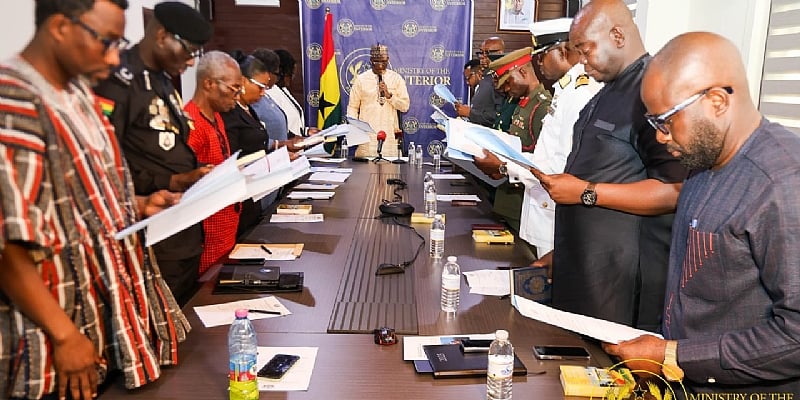Alhaji Muntaka Mohammed-Mubarak, Ghana’s Minister of the Interior, underscored the government’s dedication to passing the National Small Arms Bill 2023. This legislation is considered crucial for strengthening the legal framework governing civilian firearm possession and use, aiming to curb gun-related violence and enhance national security. The Minister’s remarks were made during the inauguration of the newly constituted Governing Board of the National Commission on Small Arms and Light Weapons (NACSA) in Accra. This event, held on July 10, 2025, marked a significant step in reinforcing Ghana’s commitment to addressing the issue of small arms proliferation.
The 15-member NACSA Governing Board comprises representatives from various governmental bodies and civil society organizations, signifying a multi-sectoral approach to tackling the complex issue of small arms control. Mr. Godwin Animli Dorgbadzi-Dorani, a Member of Parliament, was appointed as the Board’s Chairman. Other members include Dr. Adam Adamu Bonaa, Executive Secretary of NACSA, representatives from the Ghana Armed Forces, the Ministry of Foreign Affairs, the Ministry of the Interior, the Attorney General’s Office, and civil society organizations such as the West Africa Action Network on Small Arms (WAANSA Ghana). This diverse composition ensures a comprehensive and collaborative approach to policy formulation and implementation.
The inclusion of representatives from the National Security Council, the Ghana Police Service, the Ghana Immigration Service, the Customs, Excise and Preventive Service, and the Office of the President highlights the government’s commitment to a coordinated and integrated response. This collaborative approach aims to leverage the expertise and resources of various agencies to effectively address the challenges posed by the illicit trade and misuse of small arms and light weapons. The board’s composition reflects the understanding that tackling this issue requires a concerted effort across all sectors of society.
The Interior Minister emphasized the urgency of NACSA’s role, particularly in light of increasing gun-related violence within communities. He stressed the need for robust national action, including enhanced collaboration among stakeholders, to mitigate this growing threat. The Minister urged the Board to actively engage with civil society organizations, traditional leaders, the media, and youth groups, especially in border communities and areas identified as high-risk, to foster greater awareness and community involvement in curbing small arms proliferation.
The newly inaugurated Board is tasked with several key responsibilities, including driving institutional reforms within NACSA, supporting data-driven decision-making processes, and bolstering public education campaigns to reduce both the demand for and access to illicit weapons. This comprehensive approach aims to address the issue from multiple angles, focusing on prevention, enforcement, and community engagement. The Board’s focus on data-driven decision-making underscores the importance of evidence-based strategies in addressing the multifaceted challenges posed by small arms and light weapons.
Mr. Dorgbadzi-Dorani, on behalf of the Board, expressed their commitment to fulfilling their mandate and advancing disarmament efforts. He reiterated the Board’s shared goal of achieving a gun-violence-free Ghana. The Board’s primary mandate is to provide strategic guidance and oversight to NACSA, ensuring the effective implementation of policies and programs aimed at combating the proliferation and misuse of small arms and light weapons. Their commitment signifies a renewed focus on addressing this critical issue and fostering a safer and more secure environment for all citizens of Ghana. The Board’s success will be measured by its ability to translate its mandate into tangible actions that reduce the prevalence of small arms and light weapons within the country.


